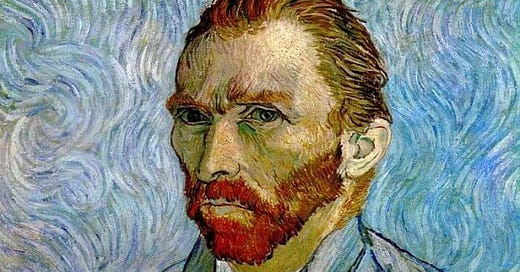Howdy all,
Today I’m thinking about money.
Is it possible to make good money as an artist? Either watch this, or scroll down to read a little extended version where I witter on about 19th century Paris and the bohemian lifestyle.
As a creative there are three things to separate, but before we get to today's money task I want to briefly look at the 'starving artist’ trope (which says artists are individuals who sacrifice financial stability and material comforts for the sake of their creative pursuits and artistic integrity). It exists due to a combination of historical, economic, and social factors, and is pretty ingrained. It might be a trope you believe to be inevitable, or one you actively rebuke, and while it does reflect many realities of the art world, it is also a simplification that overlooks the diversity of artists' experiences and the potential for financial success in the arts. So why does it exist then, what are these factors?
Historical: During the Romantic period in the 19th century, the image of the artist as a misunderstood and struggling genius became popular. Artists like Vincent van Gogh, who lived in poverty and achieved fame after he died, contributed to this narrative. Additionally, in 19th-century Paris, the Bohemian lifestyle, (a rejection of bourgeois norms and an embrace of poverty, freedom, and creativity) reinforced the idea of the artist as an outsider struggling to make a living but kind of loving it, or at least choosing it.
Economic: The art market is highly competitive and uncertain - and even that feels like I’m underplaying it. Many artists find it challenging to sell their work, and success often depends on factors beyond talent, such as networking, marketing, and market trends. Unlike many other professions, artists often lack steady employment opportunities, benefits, and institutional support, making it difficult to achieve that oh so coveted financial security.
Social: Society often undervalues creative work, both in terms of financial compensation and social recognition; so artists often get paid less for their work compared to other professions. Plus the stereotype of the starving artist, which romanticises the struggles of artists, is perpetuated by media and pop culture. It’s glamorous, it’s cool, it’s living off cigarettes and gatorade. The trope also highlights the tension between artistic integrity and commercial success. It suggests that true art is created for its own sake, not for profit, ignoring the fact that true artists also need to eat.
Oh and ALSO - arts education often emphasises the development of creative skills and techniques but may not also provide much training in business and marketing, leaving artists underprepared to navigate the commercial aspects of their careers.
It's Day 4 of the August Challenge, 31 days of tips, tasks, and resources to help creatives level up. And right now we are in reset mode.
Financial Management = SEPARATION.
Today's task is simple: separate these 3 things:
The budget - Just as you separate your grocery budget from your holiday budget, or childcare budget and bills budget, make sure you have a good awareness of the amount of £££ your practice requires from you.
The income - Most creatives have a job that provides additional income, or even most of the income. Make sure you know exactly what you get from your various income sources, this will help you to track your finances, make goals, and monitor your progress and growth in your creative career.
The goals - Whether you want to feel secure, save for something specific like a holiday, or hit a certain income target, separate your financial goals into ones that directly relate to your creative practice and ones that don’t. This might mean separate savings to cover the cost of a solo exhibition and the cost of a holiday. Separate the savings, and separate the goals.
Bonus tips
Think creatively about how you could diversify your income sources
Invest in yourself to increase future income
It's no secret that a stable financial foundation supports artistic pursuits, AND that stable finances for a creative can sometimes feel like a magical unicorn - an impossibility. But by focusing on gaining a little more clarity and control of your money, you'll be heading in the right direction.
That's all for today. Tomorrow we are talking about websites! Okay bye!



